Judges at the International Court of Justice in The Hague are set to rule today on the legal dispute between Britain and its former colony Mauritius over the fate of the Chagos archipelago. The ruling, however, is not legally binding.
The ICJ judges will rule on the legal consequences of the seperation of the Chagos Archipelago from Mauritius in 1965.
Mauritius argues that it was illegal for Britain to have broken up its territory while it was still the colonial power (from 1810 to 1968).
It claims sovereignty over the archipelago and demands the right to resettle former Chagossian residents.
Evicting the Chagossians
In 1965 and till the early 1970s, Britain separated the Chagos islands (around 55 of them) from the rest of Mauritius, paying three million pounds for them.
When Mauritius became independent in 1968, the islands remained under British control, renamed the British Indian Ocean Territory (BIOT) which also comprised the Aldabra islands and the Farquhar and Desroches islands (purchased from Seychelles in 1965 and returned to them in 1976).
In 1966 Britain leased the islands to the United States for 50 years so that it could set up a military base. In 2016 the deal was extended to 2036.
Between 1968 and 1973 around 2,000 Chagos islanders were evicted, described in a British diplomatic cable at the time as the removal of "some few Tarzans and Man Fridays".
Most were shipped to Mauritius and the Seychelles.
Today around 10,000 Chagossians and their descendants are divided among Mauritius, the Seychelles and Britain.
Britain, while apologising for the "shameful" way it evicted thousands of islanders, insisted Mauritius was wrong to have brought the case to the ICJ.
Diego, a strategic military base
The United States meanwhile said the court had a "duty" not to take a position on the row.
The US military base on Diego Garcia, the largest island of the archipelago, became of major strategic importance during the Cold War.
It offered proximity to Asia during the fall of Saigon and the Khmer Rouge takeover in Cambodia, while the Soviet navy was extending communist influence in the Indian Ocean.
After the 1979 Iranian revolution, the United States expanded the Diego Garcia base to receive more warships and heavy bombers.
In recent years it served as a staging ground for US bombing campaigns in Afghanistan and Iraq.
Chagossians fight back
Chagos islanders living in Mauritius launched legal proceedings in 1975 against their expulsion, resulting in a 1982 payment of four million pounds in compensation along with land valued at one million pounds.
There were no reparations for islanders settled in the Seychelles.
In 2007 a British appeals court paved the way for Chagossians to return home but its decision was annulled by the upper House of Lords the following year.
In 2016 the British government confirmed its opposition to the resettlement of Chagossians, including for reasons of defence, security and cost.
Marine reserve to ward off Ilois claims
In 2010 Britain declared the islands part of a Marine Protected Area, arguing that people should not be permitted to live there.
Diplomatic cables revealed by WikiLeaks quoted a British official as saying the plan "put paid to the resettlement claims of the archipelago's former residents".
The move backfired as a UN arbitration tribunal declared it illegal in 2015.





 Ejisu by-election: Vote for Kwabena Boateng to come and help me complete my work...
Ejisu by-election: Vote for Kwabena Boateng to come and help me complete my work...
 ‘He’s just hungry’ – NPP Germany takes Mr. Beautiful to the cleaners; schools hi...
‘He’s just hungry’ – NPP Germany takes Mr. Beautiful to the cleaners; schools hi...
 Politicians have hijacked ownership of media houses to suppress press freedom — ...
Politicians have hijacked ownership of media houses to suppress press freedom — ...
 Dumsor: Bawumia admits power challenges; assure Ghanaians they will be over soon
Dumsor: Bawumia admits power challenges; assure Ghanaians they will be over soon
 SML deal is just a modified form of the Agyapa deal – Bright Simons
SML deal is just a modified form of the Agyapa deal – Bright Simons
 SSNIT authorities should be appointed by contributors, not the government — Aust...
SSNIT authorities should be appointed by contributors, not the government — Aust...
 Court rejects request to compel Akufo-Addo to accept anti-gay bill for possible ...
Court rejects request to compel Akufo-Addo to accept anti-gay bill for possible ...
 Theft and vandalism cause of darkness on Tema motorway — Road Ministry
Theft and vandalism cause of darkness on Tema motorway — Road Ministry
 Akufo-Addo has shown he’s not interested in preserving Ghana’s democracy — Maham...
Akufo-Addo has shown he’s not interested in preserving Ghana’s democracy — Maham...
 Ejisu by-election: Aduomi’s vote rigging allegations baseless – Akufo-Addo
Ejisu by-election: Aduomi’s vote rigging allegations baseless – Akufo-Addo
